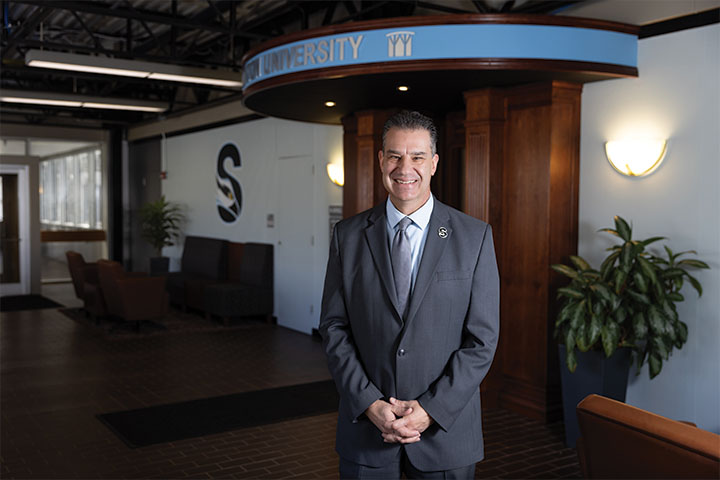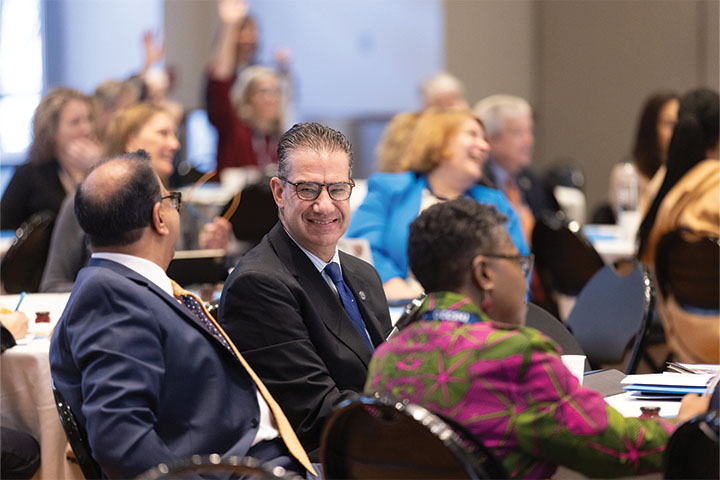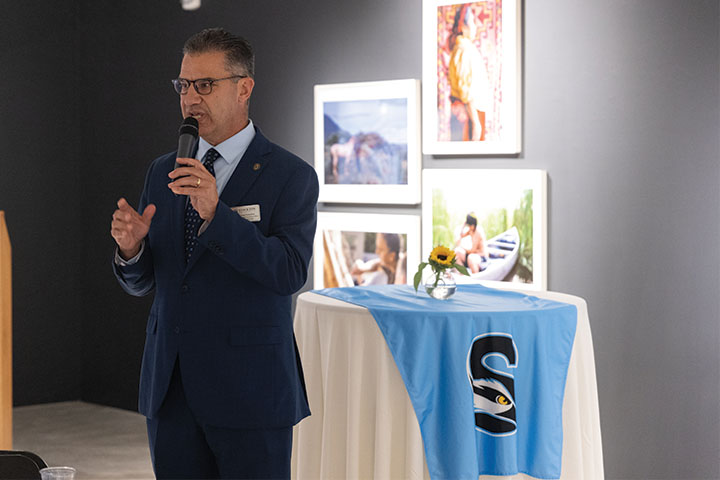New Provost Takes Scientific Approach
By Stacey Clapp

By Stacey Clapp

I n his first year as Provost & Vice President for Academic Affairs, Michael Palladino has been on a mission to meet individually with as many faculty as possible.
In fact, since joining Stockton University on May 6, 2024, Palladino has met with more than 150 faculty members, about half of the school’s academic core.
“Learning the Stockton culture has been a priority for me, so I have been spending a lot of time doing these one-on-one meetings with all our full-time faculty,” Palladino said.
As the chief academic officer at Stockton, he provides leadership to the university’s more than 160 undergraduate and graduate programs and 700 full- and part-time faculty members.
“Understanding what makes Stockton unique or different — things that matter to people at Stockton — and then trying to figure out what are the opportunities,” has been Palladino’s goal the past year. “Can we better leverage things that we're doing here that maybe we haven't done in the past?
“My job is making sure that we're strong across everything we do in academics,” said Palladino, who is a scientist by education. He holds a Ph.D. in Anatomy and Cell Biology from the University of Virginia and a bachelor’s degree from Trenton State College, now The College of New Jersey.

Palladino said some of his past experiences put him in the position to look at the academic structure in a unique way.
“I know a good bit about our competitive landscape at other institutions, whether it's that we cost less so that's an advantage or whether it's our location that can help us to think about how we position or reposition,” he said.
Palladino most recently served as Vice Chancellor for Academic Affairs at Bloomfield College of Montclair State University and was the former Vice Provost for Graduate Studies and professor of Biology at Monmouth University. He joined the biology faculty at Monmouth University in 1999 and served as Dean of the School of Science from 2008-15.
“A big part of what I spent a lot of time thinking about is how can I help our university community innovate and move forward? We are pretty young as a university,” he said, noting Stockton shifted from a college to a university just 10 years ago. “So, I think a lot about the kinds of things that we're trying to do together to help us develop as a maturing university. Whether that's the programs that we offer or how they are offered.”
Palladino is turning to data to make decisions about Stockton’s academic infrastructure. Last fall, the university engaged Gray DI to provide a complete program assessment.
“We needed a comprehensive market analysis that helps us look at new programs and new modalities. It’s great that we may be running some programs, but the market may show us we need to offer it in hybrid or online modalities, not in person,” he said. “Gray DI has a benchmarking set of data they use to look at program vitality and growth.”
Palladino said he and the deans of Stockton’s seven academic schools are just beginning to unpack what the data shows.
“There are a lot of new program ideas percolating. Some of them we shouldn’t be launching and won’t be launching, but others make sense,” he said, noting there is a lot of opportunity for growth at the graduate level.
“For an institution our size, we’re quite a bit smaller on the graduate side than we really should be. Nearly 60% of our graduate students were Stockton undergrads, so we should be looking at what programs we can build pipelines to for new graduate degrees.”
While the program review is ongoing, Palladino is excited about a few enhancements including a financial information service that provides users with real-time market data, news, analytics and trading tools on a ticker like what you might see on the trading floor of the New York Stock Exchange, which will enhance opportunities for Business students.
Learning the Stockton culture has been a priority for me, so I have been spending a lot of time doing these one-on-one meetings with all our full-time faculty,"Provost Michael Palladino
The new library learning commons will feature a makerspace where students will find a variety of tools and technology for hands-on, creative projects that allow them to design, experiment and invent when it opens in 2026.
Palladino envisions “a one-stop-shop approach” to student success by creating a more cohesive approach and space for services spanning Student Affairs and Academic Affairs that has been successful at other schools, including Bloomfield College, where he created a Center for Student Success.
“The way we think about student success has been very fragmented here, in the sense that we don't have a uniform definition of student success,” Palladino said.
To meet this challenge, he is dividing the position of Dean of the William T. Daly School of General Studies and Graduate Education into separate roles.
“This will allow us to reposition General Studies as that one-stop-shop and gateway for first-year students and students who may be less academically prepared,” he said. “We will be connecting them to advising, coaching and mentoring opportunities.”
Already, Palladino piloted a winter term with 2- and 4-week options that are designed to help students catch up or get ahead. The program will expand in the upcoming academic year due to its successful first run.
Another area where Palladino sees an opportunity to move the university forward to help both students and the community is by refocusing the Atlantic City campus.
“We are looking at implementing a very different model for Atlantic City than what we’ve been doing in the past,” he said of the campus, which opened in 2018 and includes an academic center and two residential buildings. “I’m excited about a sort of ‘college of urban studies’ model that helps elevate Stockton and the surrounding area of Atlantic City five to 10 years from now.”
As co-chair of the Strategic Planning Steering Committee, Palladino finds himself exploring all aspects of the university. The university embarked on the planning process last year and will adopt the new strategic plan that reflects the institutional aspirations and future needs in fall 2025.
Hundreds of members of the Stockton community have participated in the process to develop and shape five main themes of the plan, which include People and Campus Culture, Authentic Teacher/Scholar Model, Stewardship and Sustainability, Student Success and Community.
Palladino is also making his mark in ways that have little to do with science or data.
Shortly after arriving at Stockton, he was struck by the largely unadorned walls in the academic spine and throughout campus.
“I wanted to see more warmth in our campus spaces to create that esprit de corps for programs and departments, places where students would want to congregate.”

So, he started putting a list together. In the past six months, artwork, murals and more have begun popping up.
“We have a warehouse of art from the Noyes Museum, and we have all of the student and faculty art. We activated a group in the School of Arts and Humanities to come up with a project that we are calling Walls & Halls. Now, we are taking student, faculty and alumni art and installing it in the academic spine and around campus.”